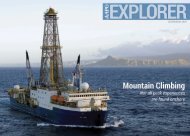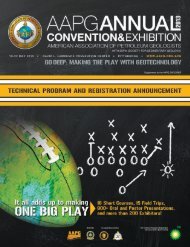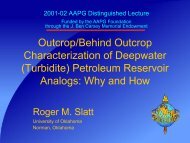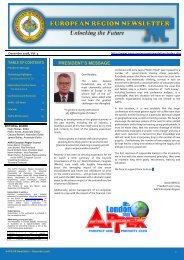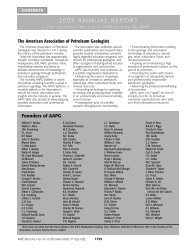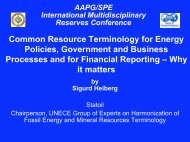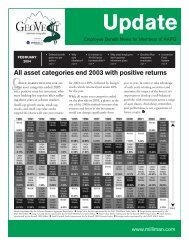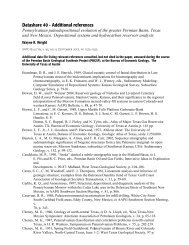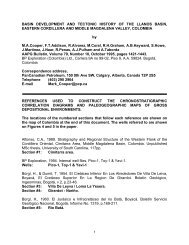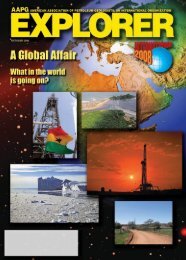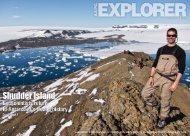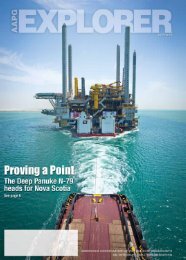AAPG Explorer - June 2010 - American Association of Petroleum ...
AAPG Explorer - June 2010 - American Association of Petroleum ...
AAPG Explorer - June 2010 - American Association of Petroleum ...
You also want an ePaper? Increase the reach of your titles
YUMPU automatically turns print PDFs into web optimized ePapers that Google loves.
DIRECTOR’SCORNER<br />
Going to Calgary? It Should be Obvious<br />
By RICK FRITZ, <strong>AAPG</strong> Executive Director<br />
Irecently read a list <strong>of</strong> questions<br />
supposedly asked <strong>of</strong> park rangers at<br />
U.S. national parks, which included<br />
these examples:<br />
u At the Grand Canyon they have been<br />
asked, is the canyon “man made?”<br />
u At Carlsbad Caverns a regular<br />
question is, “Is all <strong>of</strong> the cave<br />
underground?”<br />
u At Yellowstone National Park, “Does<br />
Old Faithful erupt at night?” is <strong>of</strong>ten asked<br />
<strong>of</strong> rangers.<br />
u The most common <strong>of</strong> all questions at<br />
the parks is, “When does the 5 p.m. bus<br />
leave?”<br />
My favorite question comes from<br />
rangers at national parks in the eastern<br />
United States. Here tourists <strong>of</strong>ten ask, “Why<br />
are there so many Civil War battlefields in<br />
national parks?”<br />
* * *<br />
I have asked my share <strong>of</strong> dumb<br />
questions in my lifetime. Sometimes we just<br />
miss the obvious.<br />
One thing I won’t miss is the upcoming<br />
<strong>AAPG</strong> ICE meeting in Calgary, Sept. 12-15.<br />
ICE is <strong>AAPG</strong>’s acronym for International<br />
Conference and Exhibition, and this will be<br />
the first time that ICE is held in Canada.<br />
The conference theme is “Frontiers <strong>of</strong><br />
Unconventional Thinking: Saddle Up for<br />
the Ride!” This is a great opportunity to<br />
experience a global technical program<br />
– including focus on unconventional<br />
reservoirs in Canada and worldwide.<br />
The technical program will include 350<br />
oral and posters on themes ranging from<br />
petroleum systems to environmental to<br />
reservoir management (refer to the <strong>of</strong>ficial<br />
DIVISIONS’REPORT<br />
ICE announcement that was included with<br />
this month’s EXPLORER for more details).<br />
I am especially interested in the session<br />
on “Exotic Reservoirs <strong>of</strong> the World –<br />
Chalks, Cherts, Phosphates, Granites and<br />
Hydrates.”<br />
There will be a special focus on<br />
Tuesday on shale reservoirs.<br />
Several special sessions and forums<br />
will be held. Notable is the forum on “E&P<br />
Challenges in Complex Environments:<br />
From Arctic to Deep Water.” Also on<br />
Monday is a special lecture on “Burgess<br />
<strong>AAPG</strong><br />
Shale Tales” that should be interesting.<br />
There also are great opportunities<br />
for continuing education. “Creative<br />
<strong>Petroleum</strong> Exploration” will be a highlight,<br />
plus courses from “Fault Seal Analysis”<br />
to “Geomechanics for Unconventional<br />
Reservoirs.”<br />
In addition, the Canadian Society<br />
<strong>of</strong> <strong>Petroleum</strong> Geologists is conducting<br />
one <strong>of</strong> its well-known core conferences.<br />
Participants will review up to 30 integrated<br />
core and poster displays. Focus is on<br />
unconventional, frontier and international<br />
EXPLORER<br />
hydrocarbon systems.<br />
<strong>AAPG</strong>’s Energy Minerals Division also is<br />
conducting a core workshop on the Alberta<br />
oil sands.<br />
Of course, when you are talking about<br />
September in the Canadian Rockies you<br />
are talking about great weather for great<br />
field trips. There are currently nine preconference<br />
and seven post-conference<br />
field trips planned. Trips are scheduled<br />
from the Fraser River <strong>of</strong> British Columbia to<br />
the southern plains <strong>of</strong> Alberta.<br />
This is a tremendous opportunity to get<br />
back to the rocks and spend quality time in<br />
the field.<br />
Finally, this will be a great opportunity<br />
to network with geoscientists from all<br />
parts <strong>of</strong> the globe and view the newest<br />
technologies on the exhibit floor.<br />
The entire meeting will be held in the<br />
TELUS Convention Centre in downtown<br />
Calgary, so it will be a very convenient<br />
venue.<br />
* * *<br />
The most common answer by rangers to<br />
the question, “Why are there so many Civil<br />
War battlefields in National Parks” is: “Well,<br />
they fought here to be close to the parking<br />
lots, toilets and restaurant facilities.”<br />
Of course, that is obvious.<br />
So ICE in the second week <strong>of</strong><br />
September? This seems pretty obvious,<br />
too. We hope to see you there.<br />
DEG Looks for E&P, Environment Balance<br />
By MICHAEL A. JACOBS, DEG President<br />
In this, my last article as president <strong>of</strong><br />
the Division <strong>of</strong> Environmental Geology,<br />
I am going to take a few moments<br />
to express my thanks to all <strong>of</strong> the hard<br />
working DEG members who helped<br />
throughout the year to make this a<br />
tremendously successful year.<br />
Thanks to all the DEG <strong>of</strong>ficers,<br />
Advisory Board members, EG Journal<br />
Editor, DEG committee members,<br />
<strong>AAPG</strong> staff members and all the other<br />
DEG volunteer members who did an<br />
exemplary job putting together programs<br />
and moving forward with many new<br />
initiatives.<br />
DEG is making great headway in<br />
its efforts to grow more internationally,<br />
and members such as Peter Lloyd, Jeff<br />
Aldrich, Peter Kukla, David Cook and<br />
others are working toward a joint meeting<br />
with the Geological Society <strong>of</strong> London<br />
related to the geological sequestration<br />
<strong>of</strong> CO 2 . DEG put on excellent programs<br />
at the annual meetings and in several<br />
Sectional meetings and formed an <strong>of</strong>ficial<br />
affiliation with the Environmental and<br />
Engineering Geophysical Society.<br />
And we aren’t done yet. We all know<br />
that the reward for a job well done is the<br />
opportunity to do more.<br />
FRITZ<br />
An education and advocacy role<br />
* * *<br />
That said, I think it is fair to say the<br />
recent events taking place in the Gulf <strong>of</strong><br />
Mexico highlight some <strong>of</strong> the purposes<br />
behind the existence <strong>of</strong> the Division <strong>of</strong><br />
“Environmental” Geosciences.<br />
But first, I think we all need to take<br />
a moment for thoughtfulness and<br />
prayers for those families who lost their<br />
loved ones in this tragedy. We should<br />
always be reminded that no matter how<br />
smart we think we are, or how good <strong>of</strong><br />
explorationists we claim to be, it is the rig<br />
hands and roughnecks that are tasked<br />
with the daunting and dangerous task<br />
<strong>of</strong> bringing these hydrocarbons to the<br />
surface. Whether it is on a huge multimillion<br />
dollar, deepwater rig in the Gulf<br />
This is a great opportunity to<br />
experience a global technical program<br />
– including focus on unconventional<br />
reservoirs in Canada and worldwide.<br />
Calgary, site <strong>of</strong> this year’s <strong>AAPG</strong> International Conference and Exhibition, set Sept. 12-15.<br />
JACOBS<br />
Both the exploration geoscientist and<br />
the environmental geoscientist will be<br />
working side by side to see that these<br />
expectations can be satisfied.<br />
<strong>of</strong> Mexico or just a small rig running out<br />
in the dusty desert <strong>of</strong> the Permian Basin,<br />
where two roughnecks lost their lives in<br />
separate accidents just this week alone,<br />
it is a dangerous business we are in.<br />
My respect and admiration goes out to<br />
these individuals.<br />
It will be some time, perhaps years,<br />
before the full environmental impact <strong>of</strong><br />
this incident is fully assessed. It will no<br />
doubt change the way that exploration<br />
and production goes on in the <strong>of</strong>fshore<br />
environment – and as with all tragedies,<br />
after all the investigations are completed<br />
we will in the long run be better, and<br />
safer, at how we conduct our business in<br />
these environments.<br />
I hope that DEG members will be<br />
able to put together some sessions and<br />
papers on the environmental impact <strong>of</strong><br />
this incident in future <strong>AAPG</strong> meetings.<br />
To me, that is the primary job <strong>of</strong> the<br />
DEG – to be the voice and the advocate<br />
<strong>of</strong> this industry on all environmental<br />
matters related to E&P activities, and<br />
to educate <strong>AAPG</strong> members and the<br />
general public on how we can balance<br />
the search for and the production <strong>of</strong><br />
hydrocarbons with protection <strong>of</strong> the<br />
environment.<br />
DEG puts on numerous sessions<br />
and talks on the impact <strong>of</strong> hydrocarbon<br />
releases and spills to the environment,<br />
but more importantly these talks<br />
present real solutions to these impacts<br />
See DEG, page 50<br />
WWW.<strong>AAPG</strong>.ORG JUNE <strong>2010</strong><br />
51



